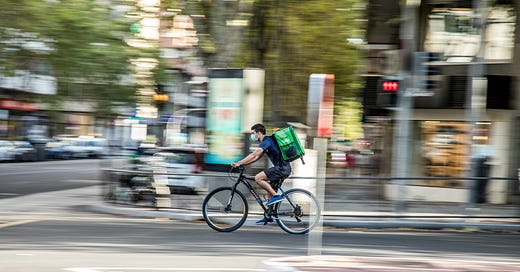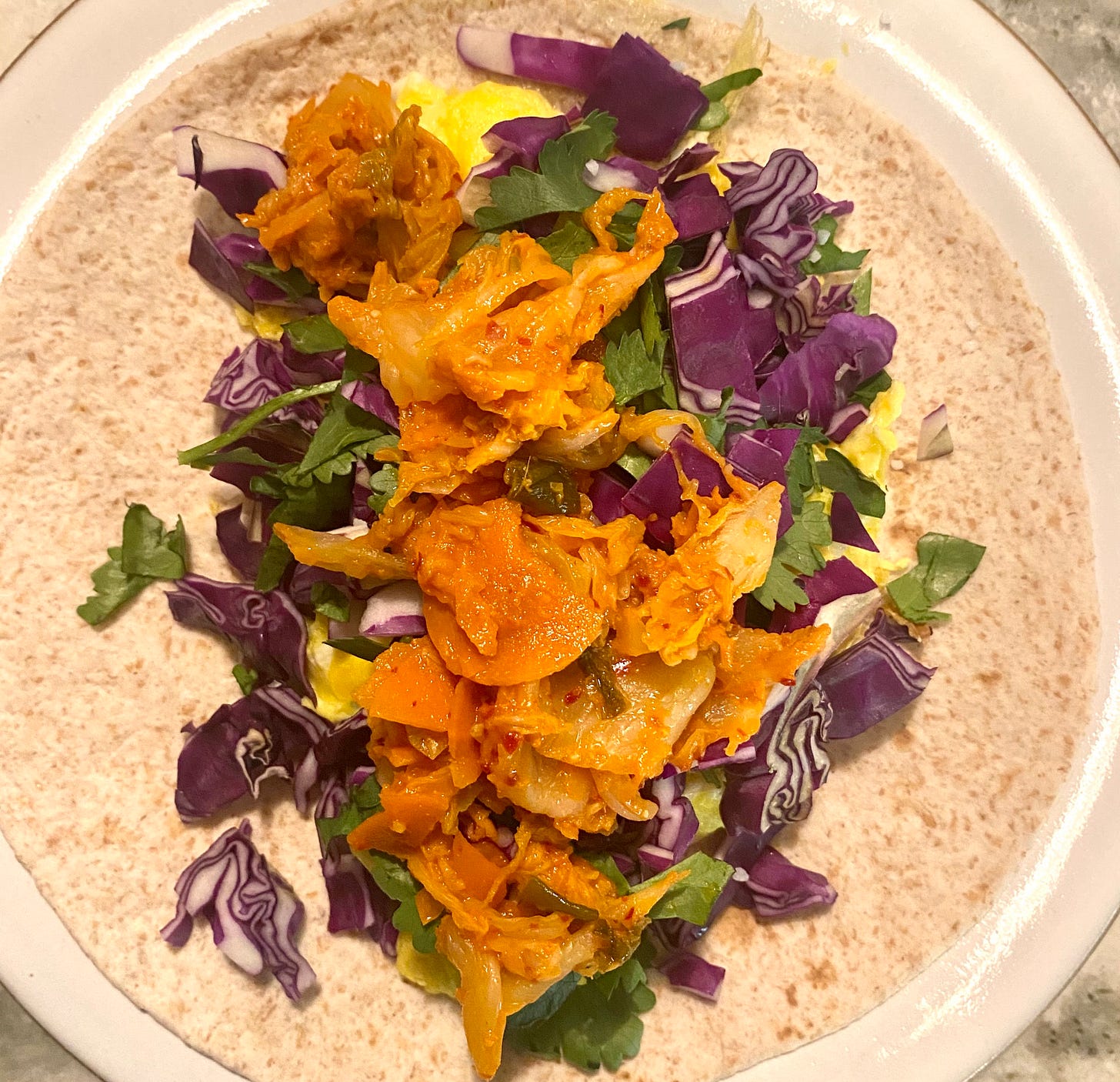DoorDash CEO awarded $414 million during a terrible year for restaurants and workers
"Just knowing that his compensation is off the backs of workers...it's disgusting.”
As a delivery driver for DoorDash—what the company calls a “Dasher”—Willy Solis is used to making constant calculations. In his region in the suburbs of Dallas, Texas, he told me the lowest rate offered for a delivery (or “Dash”) is $2.50. Customers might tip on top of that, but he doesn’t find out until the job is completed. (DoorDash says the “low offers” make up a small percentage of deliveries and that it’s up to customers to add tips before or after delivery.)
“So I'm looking at the $2.50 pay and trying to decide if the distance is worth it, if my time is worth it,” he explains. He even considers factors like whether the restaurant has a history of making Dashers wait when they arrive for pick-ups. “If I think that it's gonna be a really quick thing...then I will take the risk and hope that the customer did tip, but a lot of times they don't. So I’ll be stuck with just $2.50, and if there were wait times or if the distance was too long or whatnot, then I'm losing money.”
When all is said he done, he said he typically makes $10 to 12 per hour, before expenses like car insurance and gas. Previous reporting suggests that wage is fairly typical, although rates vary depending on the app, city, and worker’s experience, and some clear $20. One limited analysis of 2019 data found that after some expenses were factored in, Dashers actually made an average of $1.45 per hour.
All of this math might as well exist in a different universe compared to a number shared by the New York Times this week: $414 million. Except it doesn’t, it exists within the same company; that’s the total value of the compensation package DoorDash CEO Tony Xu collected in 2020.
I shared the data point in a matter-of-fact way on Twitter, and it generated so much engagement, I decided the issue was worth reporting on.
Unwrapped
It’s especially important because Xu is far from a unique example. His compensation is part of a pattern revealed by a recent survey, which found that during the pandemic, CEO pay went up 14 percent while worker pay rose 1.9 percent. In 2020, CEOs in the survey were paid 274 times the pay of a median employee at their companies. (To be clear: Xu did not get paid $414 million in cash. His compensation package includes several bundles of stock shares, and their actual value will partially depend on how the stock performs. Reporter Peter Eavis gives a full accounting in the Times story.)


To further widen the gap, the rich are able to influence policy and exploit tax loopholes to hold onto their money in ways workers never will. A ProPublica investigation published last week found that several multimillionaires and billionaires paid $0 in federal income taxes in recent years.
And all of this is coming out after a year when food workers like Solis found their jobs to be “much more difficult than under normal circumstances,” as they navigated buying PPE and protecting themselves and the customers they interacted with from COVID-19.
With everyone at home and hungry for delivery during the pandemic, DoorDash charged struggling restaurants hefty fees for its service. In many places, local governments found the fees to be so egregious, lawmakers stepped in to place caps on what the company and its competitors could charge restaurants. According to a December report, at least 110,000 restaurants closed permanently after struggling to stay afloat during the pandemic.
A similar disconnect was amplified in other sectors of the food industry, too.
As I reported last August, while meat companies forced low-wage workers back into processing plants and some farmers suffered losses during outbreaks that shuttered those plants, the companies warned of price increases and meat shortages. Instead, many of them “saw their profit margins increase. Cargill reported a net income of $3 billion, up 17 percent compared to the year before, and paid its family owners record dividends.”
Grocery chains saw their profits soar while distributing minimal hazard pay to in-store workers. One report found profits were up an average of 39 percent at supermarkets in 2020. Kroger’s net earnings nearly doubled compared to 2019, to $2.7 billion in the first three quarters of the year. "Amazon and Walmart could have quadrupled the hazard pay they gave their front-line workers and still earned more profit than the previous year," one of the report's authors told the Detroit Free Press.


As for DoorDash, 2020 did deliver one win for Dashers. The company agreed to pay $2.5 million to settle a DC lawsuit alleging its old payment system often directed customer tips to DoorDash instead of delivery people. (The company has not admitted wrongdoing.) $1.5 million of that money will go to DC drivers, but most Dashers will continue to do complicated math to determine, hour by hour, if they’ll be able to make even close to a living wage working for the company.
Solis is now a lead organizer for the Gig Workers Collective, and he said he continues to work for DoorDash and other food delivery companies so that he can provide insight into what the jobs are like and advocate for his peers who are busy rushing to drop off tacos and pizzas. “By staying here and actually giving voice to workers’ concerns, I think that's our only way of fighting back,” he said.
When I asked him how he felt when he heard the number—the $414 million—he said it was hard not to be angry and resentful off the bat. “Just knowing that his compensation is off the backs of workers, and not only gig workers but also restaurant workers, because they pull a lot of money from restaurants...it's disgusting,” he said. “I don't know if he deserves the compensation he’s getting or not. What I do know is that...so many workers are being marginalized by a system that is designed to make us fail.”
Wrapped up to go
*$414 million = the total value of the compensation package DoorDash CEO Tony Xu collected in 2020, during a very difficult year for workers and restaurants.
*In many sectors of the food industry, the pandemic led to higher profits for big companies and executive compensation increased, while worker pay increased very little.
Still hungry?
Dead bees, sick residents, unanswered questions…This week, Civil Eats published a story I worked on for a very long time about a developing environmental and public health disaster in Nebraska. It’s about a biofuel plant that decided to use seeds treated with toxic pesticides to manufacture ethanol and then spread the contaminated byproducts of that process all over the town. The company used those seeds because pesticide companies apparently have a lot of them each year that they need to dispose of, which points to a bigger long-term issue.
Actually eating
I have been traveling to family events every single weekend in June, and I haven’t been keeping up with food shopping the way I normally do. So I was proud of this lunch I threw together with random things left in the fridge and thought it could inspire a delicious, fast meal or two: two eggs scrambled, red cabbage, cilantro, and HEX kimchi in a wrap. (I loaded it up so much I couldn’t roll it like a wrap, so I just ate it like a taco.)
Let’s be friends
Follow me on Twitter and Instagram to continue the conversation. See you next week!





